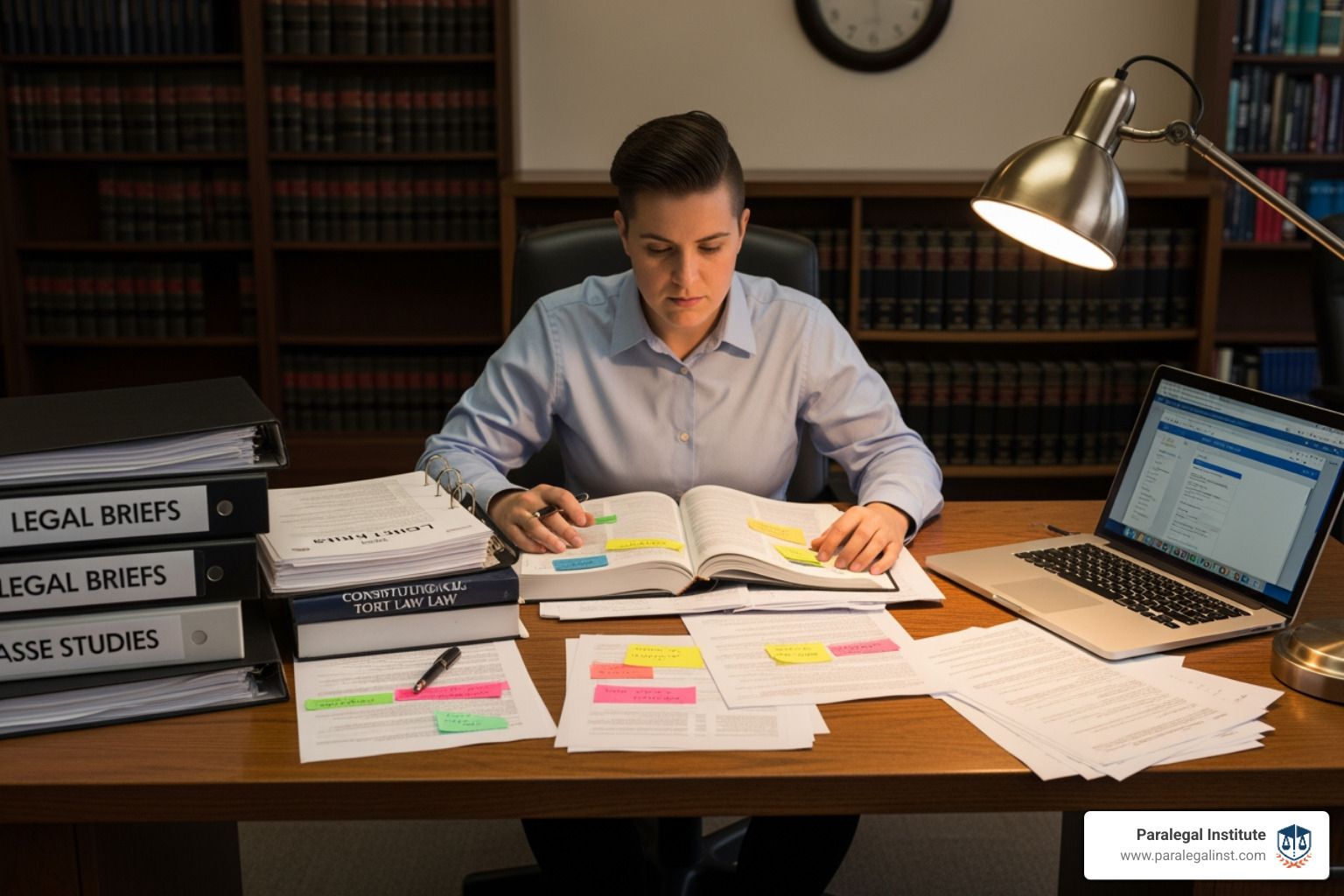Paralegal Studies Certificates Explained: Your Path to Law
What is a Paralegal Studies Certificate and Why Does It Matter?
A paralegal studies certificate is a specialized educational credential that qualifies graduates to work as paralegals under attorney supervision. This certificate program teaches essential legal skills without requiring a full law degree.
Quick Facts About Paralegal Studies Certificates:
- Definition: A non-degree educational program focused specifically on paralegal skills
- Duration: 15 weeks to complete
- Format: Available in-person or hybrid
- Requirements: Requires high school diploma or GED
- Core Skills: Legal research, writing, document preparation, and procedural knowledge
- Career Outcome: Qualifies graduates for paralegal positions
Paralegal certificates differ from degrees in their focused curriculum and shorter timeframe. While associate or bachelor's degrees include general education courses, a paralegal studies certificate concentrates solely on the practical skills needed for legal work.
The demand for trained paralegals continues to grow, with the U.S. Bureau of Labor Statistics projecting a 14% increase in paralegal jobs by 2031. This growth outpaces many other professions, making a paralegal studies certificate a strategic choice for those seeking entry into the legal field.
Certificate programs typically include courses in:
- Legal research and writing
- Civil litigation procedures
- Contract law
- Ethics and professional responsibility
- Legal technology
I'm Matthew Pfau, an attorney who has trained numerous paralegals throughout my career and developed comprehensive paralegal studies certificate curriculum after seeing the critical skills needed for success in law firms.
Paralegal Studies Certificate: What You Need to Know
Think of a paralegal studies certificate as your express ticket into the legal world—without the three-year law school journey and mountain of student debt. But what exactly is this credential, and how can it launch your legal career?
Paralegals are much more than legal paper-pushers. They're skilled professionals who conduct meaningful legal work under attorney supervision. On any given day, you might research case law, draft important legal documents, interview witnesses, organize evidence, or help attorneys prepare for high-stakes court appearances.
While you'll sometimes hear "paralegal" and "legal assistant" used interchangeably, there's an important distinction. Paralegals typically handle substantive legal work requiring specialized knowledge, while legal assistants often focus more on administrative support. Your paralegal studies certificate specifically prepares you for the paralegal role with its deeper legal responsibilities.
One boundary you must understand: paralegals cannot give legal advice, set legal fees, accept cases, or represent clients in court. These activities constitute the unauthorized practice of law—a serious ethical violation unless you're a licensed attorney. Your certificate prepares you to work alongside attorneys as a vital team member, not to practice law independently.

How a paralegal studies certificate fits into the legal team
With a paralegal studies certificate, you become an essential part of the legal ecosystem. You're the attorney's right hand—conducting research, drafting documents, and managing case details that keep legal matters moving forward.
Your certificate qualifies you to master legal research using specialized databases like Westlaw and LexisNexis, draft persuasive legal documents from pleadings to motions, gather critical information from clients and witnesses, organize evidence and case files, and provide invaluable support during trial preparation.
The Bureau of Labor Statistics confirms the bright outlook for paralegals, with employment projected to grow 14% through 2031 —much faster than average. The Portland area shows particularly strong demand, with projected growth of 15.5% through 2027 and average annual salaries around $70,817.
Your role's scope will vary depending on where you work. In smaller firms, you might be a paralegal jack-of-all-trades, handling everything from family law to personal injury cases. At larger firms, you could specialize in areas like corporate transactions, intellectual property, or complex litigation.
Starting Your Career with Paralegal Certificate: first steps
Your paralegal studies certificate is just the beginning. Here's how to transform that credential into a thriving career:
Craft a targeted resume that showcases the specific legal skills you've gained—from legal research techniques to document drafting. Tailor each cover letter to show employers exactly how your skills match their needs. Your certificate program has given you marketable abilities; now it's time to make them shine on paper.
Building your professional network is crucial. Join paralegal associations like the National Association of Legal Assistants or the National Federation of Paralegal Associations for job boards, networking events, and continuing education. Attend local legal gatherings to meet attorneys who might be hiring or know someone who is.
Don't overlook internships or volunteer work with legal aid organizations if your first paid position is proving elusive. These opportunities build your resume while helping those who need legal assistance most.
Ready to learn more about turning your certificate into a career? Visit our guide on Starting Your Career with Paralegal Certificate for detailed strategies and success stories.
Admissions, Formats, Costs & Timeframe
Starting your journey toward a paralegal studies certificate is easier than you might think, with plenty of options to fit your life and learning style.
At The Paralegal Institute, we keep our entry requirements straightforward. You'll need a high school diploma or GED, basic computer skills (if you can use Word and steer the internet, you're good to go!), and you must be at least 18 years old when you enroll. No legal background required—that's what we're here to teach you!
The application process is refreshingly simple: complete our application form, provide proof of your education, and sometimes we'll ask for a brief statement about why you're interested in becoming a paralegal. It's our way of getting to know you and your goals.
When it comes to how you'll learn, we believe in choices. Some students thrive in virtual classrooms, while others prefer face-to-face interaction. That's why we offer several formats:

Online vs. On-Campus paralegal studies certificate options
Choosing between online and campus-based learning comes down to what works best for your life and learning style.
With our online program, you can literally learn in your pajamas if you want! You'll save time and money on commuting, and have the flexibility to fit coursework around your existing commitments. Many of our students particularly appreciate being able to review recorded lectures when tackling complex topics. Our online courses include live Zoom sessions that bring the best of both worlds—the convenience of learning from home with the engagement of real-time instruction.
Our on-campus option at our Las Vegas location gives you that traditional classroom experience with its own advantages. You'll have immediate feedback from instructors, face-to-face discussions with classmates, and a structured environment that many find helps them stay motivated and focused.
How long does a paralegal studies certificate take?
One of the most common questions we hear is, "How quickly can I get my certificate?" The answer depends on how intensively you want to study:
If you're eager to jump-start your career, our accelerated 15-week program packs everything you need into just under four months. Fair warning: this is an intensive experience requiring about 12-18 hours weekly, but our graduates tell us the quick path to a new career is worth the temporary time crunch.
Funding your certificate without breaking the bank
A paralegal studies certificate is an investment in your future that won't break the bank like law school—but we understand it's still a significant expense. Here's how our students make it work:

Many students take advantage of our installment plans to spread payments over several months rather than paying one lump sum. This can make a big difference in managing your monthly budget while investing in your education.
If you're currently working, check if your employer offers tuition assistance. Many companies will help fund education that improves your skills, even if you're planning to transition to a new role eventually. It never hurts to ask!
Don't overlook scholarship opportunities. While they're not as common for certificate programs as for degrees, they do exist.
At The Paralegal Institute, we firmly believe financial constraints shouldn't stand between you and your career goals. Our admissions team works one-on-one with prospective students to explore all available options. We're committed to making our program accessible because we know the value a paralegal studies certificate brings to your career prospects.
For more details about online learning options, check out our guide on How to Get Your Paralegal Certificate Online.
Coursework, Practical Skills & Ethical Limits
When you enroll in a paralegal studies certificate program, you're signing up for a thoughtfully crafted curriculum that balances legal theory with hands-on skills you'll use from day one on the job.
Most programs, including ours at The Paralegal Institute, cover essential core courses that form the backbone of paralegal work. You'll start with an Introduction to Paralegal Studies, where you'll learn the vocabulary, court systems, and professional expectations that set the stage for everything else. The Legal Research and Writing course teaches you how to find the law, analyze it, and communicate it clearly—skills you'll use every single day as a paralegal.
As you progress, you'll dive into Civil Litigation, where you'll learn the lifecycle of a lawsuit from the initial complaint through trial and appeal. Your Contract Law course demystifies agreements that drive business relationships, while Torts and Personal Injury covers the legal remedies when someone has been wronged or harmed. Throughout it all, Legal Ethics ensures you understand the boundaries and responsibilities of your role.
"We don't just teach students what the law is—we teach them how to apply it in real-world situations they'll encounter as paralegals," explains one of our instructors at The Paralegal Institute. This practical focus is what makes certificate programs so valuable for rapid career entry.
Many programs also include specialized courses like Criminal Law, Family Law, Real Estate Law, and increasingly important areas like Legal Technology. These technology skills have become essential as law firms modernize their practices.

Inside an accelerated paralegal studies certificate schedule
Our 15-week program at The Paralegal Institute moves quickly but purposefully. A typical week flows like this:
Early in the week, you'll tackle reading assignments and video lectures introducing new concepts. By Wednesday, you'll join a live online discussion where instructors clarify confusing points and expand on how these concepts apply in practice. Thursday and Friday focus on skills practice and assignment work, while weekends are perfect for deeper research and writing tasks.
The projects grow increasingly complex as you build your skills. Week 7 sees you drafting complaints and answers for a mock case. In week 10, you're preparing discovery documents. By week 15, you're writing a legal Motion.
For a deeper look at how accelerated programs work, visit our page on Accelerated Paralegal Certificate Programs.
Internships & real-world practice
There's nothing quite like seeing how legal work happens in the real world.

A good internship typically involves at least 120 hours of supervised work in a law firm, government agency, or corporate legal department. You'll be mentored by practicing attorneys or senior paralegals who guide you through real cases and client interactions. This experience is invaluable not just for skill-building but also for making professional connections that could lead to job offers.
At The Paralegal Institute, we help match students with internship placements aligned with their career interests, whether that's family law, corporate practice, or public interest work.
Ethical and legal boundaries every paralegal must know
Understanding what you can and cannot do as a paralegal isn't just about following rules—it's about protecting clients, the attorneys who supervise you, and your own career.
The most fundamental principle is avoiding the unauthorized practice of law (UPL). As a paralegal, you cannot give legal advice, accept cases, set legal fees, or represent clients in court. Your work, no matter how sophisticated, must be supervised by an attorney.
Confidentiality is equally critical. Information about clients and their cases is private, and your obligation to protect it continues even after you've left a job. Similarly, you must be vigilant about conflicts of interest, promptly disclosing any potential conflicts and participating in conflict-checking procedures.
Paralegals must also maintain competence in their areas of practice. If you're asked to work on something beyond your knowledge or training, the ethical response is to seek guidance or additional education—not to wing it.
"Ethics isn't just a course you take and forget," one of our instructors often reminds students. "It's the foundation of everything you do as a paralegal. One ethical misstep can have serious consequences for clients, attorneys, and your career."
State laws often define paralegal roles specifically. In California, for example, Business and Professions Code §6450 outlines who may call themselves a paralegal and what activities they may perform. Understanding these state-specific regulations is crucial for practicing within legal boundaries.
By mastering both practical skills and ethical principles, paralegal studies certificate graduates enter the workforce prepared not just to do the job, but to do it with integrity and professionalism.
Cost, Financial Aid & Career Outlook
When considering a paralegal studies certificate, it's important to look at both the investment required and the potential returns for your career. Let's break down what you can expect financially and professionally.
The total cost of earning your certificate includes more than just the sticker price of tuition. You'll also need to budget for books and materials, technology fees for online platforms, and application fees. Many students overlook potential hidden expenses like exam proctoring fees, subscriptions to legal research databases, required software, or printing costs for assignments.
Fortunately, your investment can pay off handsomely. The legal field continues to grow, with the Bureau of Labor Statistics projecting a robust 14% increase in paralegal jobs by 2031—significantly outpacing the average growth rate for all occupations.
Employers eager for new certificate holders
Law firms of all sizes remain the traditional landing spot for new certificate holders, but your opportunities extend far beyond that. Corporate legal departments in banking, insurance, healthcare, and technology regularly hire paralegals to handle their internal legal needs. Government agencies at all levels offer stable positions with excellent benefits, while courts and judicial offices provide an inside look at our legal system.
Don't overlook opportunities with legal aid organizations and nonprofits if you're passionate about access to justice issues. Even legal technology companies seek paralegals who understand both legal processes and technology.
Some of the most active employers for new certificate holders include litigation firms handling personal injury or family law cases, corporate compliance departments managing regulatory requirements, and insurance companies processing claims. Real estate offices and healthcare systems also regularly seek paralegals with fresh training and contemporary skills.
Leveraging your paralegal studies certificate for advancement
Your paralegal studies certificate is just the first step in what can be a rewarding, evolving career path. Smart paralegals continually find ways to increase their value and advance their careers.
Consider specializing in high-demand practice areas like intellectual property, immigration, or healthcare law through targeted on-the-job experience or additional coursework. Technology expertise is increasingly valuable—becoming the go-to person for e-findy platforms or case management software can make you indispensable.
Project management skills allow you to handle more complex cases and coordinate teams, while leadership opportunities within your organization or professional associations can showcase your potential for advancement. Many successful paralegals also pursue complementary credentials in areas like notary services or specialized legal software.
"The field is constantly evolving," notes one of our career counselors at The Paralegal Institute. "The most successful paralegals view their certificate as a foundation to build upon rather than an endpoint."
Many of our graduates return for continuing education workshops to stay current with changing legal procedures and technologies. This commitment to ongoing learning is exactly what sets apart those who turn a paralegal studies certificate into a thriving, growing career.
To prepare for professional advancement opportunities, check out our resources on Prepare for Paralegal Certificate Exams for additional guidance on maximizing your career potential.
Frequently Asked Questions about Paralegal Studies Certificates
What admission materials do I need?
Starting your journey toward a paralegal studies certificate is simpler than you might think! Most programs keep the paperwork manageable so you can focus on preparing for your new career.
For most programs, including ours at The Paralegal Institute, you'll typically need to provide:
Your completed application form, proof that you've earned your high school diploma or GED, and simple aptitude test, and the application fee. Some programs might ask for a brief personal statement explaining your interest in the paralegal field, and if you've taken college courses before, you might need to submit those transcripts as well.
"We've intentionally streamlined our application process," explains our admissions coordinator. "Most applicants can complete everything in under an hour. We want to remove barriers, not create them."
Are programs offered fully online?
Absolutely! In today's connected world, many paralegal studies certificate programs offer completely online options that fit busy schedules and diverse learning preferences.
These online programs typically come in different formats to accommodate various learning styles:
Some feature synchronous learning with scheduled live sessions where you'll interact directly with instructors and classmates in real-time. Others offer asynchronous options where you complete coursework on your own schedule within certain deadlines. Many programs, including ours at The Paralegal Institute, use a hybrid approach combining both methods for the best of both worlds.
It's worth noting that quality programs often require some synchronous instruction to ensure you're getting the interaction and feedback needed to truly master the material. Our program features live Zoom sessions twice weekly, giving you that valuable face-to-face time while still allowing you to study from anywhere with internet access.
Can a paralegal work independently?
This is one of the most common questions we receive, and the answer is an important one: No, paralegals cannot practice law independently.
Across all states, including Nevada where our Las Vegas campus is located, paralegals must work under attorney supervision. Without this supervision, you'd be crossing into the unauthorized practice of law, which carries serious penalties.
What paralegals cannot do includes providing legal advice directly to clients, accepting cases, setting legal fees, representing clients in court, or establishing attorney-client relationships.
That said, experienced paralegals often enjoy considerable autonomy within their proper role! With the right paralegal studies certificate training and professional experience, you might find yourself managing entire case files, conducting client interviews, drafting sophisticated legal documents, and coordinating with various legal professionals—all with appropriate attorney oversight.
"The relationship between attorneys and paralegals is collaborative," explains one of our instructors who practiced law for 15 years. "The best attorneys give their paralegals room to shine while providing the supervision required by law. It's a balance that works beautifully when both parties understand and respect the boundaries."
Have more questions about earning your paralegal studies certificate? Our admissions team is just a phone call away, ready to help you take the first step toward your new legal career.
Conclusion & Next Steps
A paralegal studies certificate offers a direct path into the legal profession without the time and expense of law school. With strong job growth projected through 2031 and competitive salaries, the paralegal field represents an excellent career opportunity for detail-oriented professionals who enjoy substantive legal work.
The key benefits of pursuing a certificate include:
- Focused curriculum without general education requirements
- Shorter completion time (15 weeks)
- Lower cost than degree programs
- Immediate job-ready skills
- Flexibility to specialize in various legal areas
At The Paralegal Institute, our 15-week accelerated program is designed to get you from enrollment to employment as efficiently as possible. Our curriculum, developed by practicing legal professionals, focuses on the practical skills most in demand by employers in Las Vegas and nationwide.
Your next steps to launching a paralegal career:
- Research programs to find the right fit for your schedule, learning style, and career goals.
- Apply to your chosen program with all required materials.
- Prepare for success by organizing your schedule to accommodate coursework.
- Network with legal professionals even before you complete your certificate.
- Begin your job search about a month before graduation.
We invite you to explore how The Paralegal Institute can help you achieve your legal career goals. Our experienced instructors, practical curriculum, and career support services are designed to ensure your success from enrollment through employment and beyond.
Ready to take the first step? Contact us today to learn more about our paralegal studies certificate program and how it can launch your legal career.










